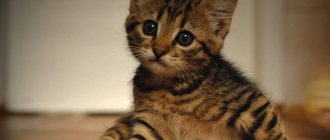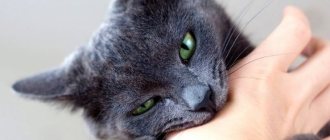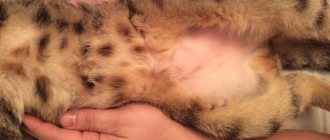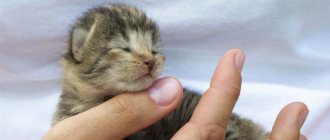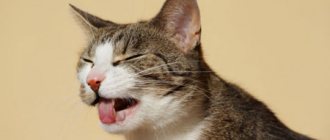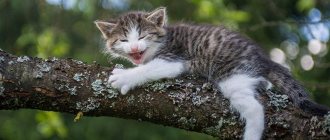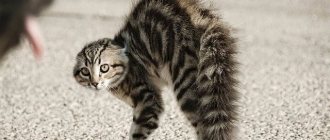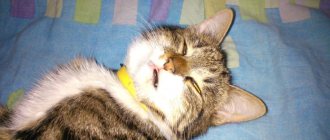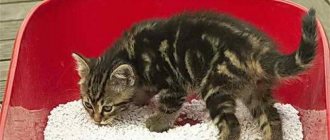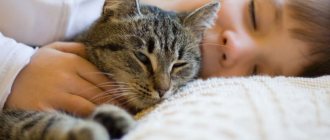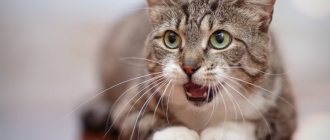Understanding the world around us
Kittens and young cats may taste the soil or chew other non-edible objects as part of normal exploratory behavior.
In this case, it is advisable to switch the kitten’s attention from the pot with the plant to other, more suitable objects for chewing. Offer your kitten new toys, including ones that can be chewed on. It is important not to maintain the habit of tasting houseplants and digging in the soil, since some indoor plants can be very toxic to cats (for example, representatives of lilies), and eating soil can cause vomiting and diarrhea, and the appearance of the apartment after “proceedings” with a flower usually leaves much to be desired. Some cats and kittens sometimes begin to use flower pots as an additional tray, which does not at all fit into the ideas of most cat owners about a domestic idyll. Therefore, if a cat or kitten stubbornly and persistently pays attention to a house plant, and distraction methods do not help, it is recommended to remove this object of attention completely so as not to reinforce unwanted forms of behavior.
Stomach cleansing
Representatives of the cat family tend to cleanse the intestines and stomach of parasites and accumulated hair. In the wild, animals use sand as a sorbent. It irritates the mucous membrane and leads to vomiting along with hair clots, and also destroys parasites in the colon. Therefore, the explanation for why a cat eats soil may lie in the body's natural cleansing process.
Earth or sand may be present in the feces, and the animal will eat the soil with such a problem greedily. Laboratory analysis will help determine the presence of a worm. This way you can confirm the relationship between eating soil and the presence of parasites.
At the same time, preventive measures do not provide a 100% guarantee of protection against worms and pests, since their range of action is limited.
Lack of attention
Boredom, monotony of the environment, and insufficient attention from the owner can provoke unusual behavior in the pet. For example, if a cat gets little attention, and as soon as she starts digging in the pot, everyone suddenly starts running, screaming, and picking her up, then it is quite possible that in her mind this will be a good way to get rid of boredom and get the attention she needs. Therefore, try to make the cat’s life within the apartment as varied and interesting as possible (as much as possible). Buy new toys, arrange new places for sleeping, viewing and observation, place dry food pellets in unusual places - this will stimulate exploratory behavior. Finally, play with your cat for at least 10 to 15 minutes every day.
Why does a cat attack indoor plants?
Pets of all ages experience an irresistible craving for plants, regardless of their gender. If a cat encroaches on your favorite flowers, do not rush to scold her and try to figure out the reason for what is happening.
Desire to eat a flower
Eating leaves and stems of indoor plants indicates a lack of vitamins. Street animals eat grass all the time, so they don’t face this problem. Pets do not have this opportunity, so they often do not receive enough folic acid, calcium, potassium, phosphorus and sodium.
With severe vitamin deficiency, the mustachioed pet begins to eat not only greens, but also the earth. This can lead to diarrhea, vomiting and severe poisoning.
Also, do not forget that any greens are enriched with fiber. This important element is necessary for comfortable digestion and artificial stimulation of vomiting. In addition to trichobezoars (hairballs), the animal can be bothered by worms, gastrointestinal pathologies and infections.
Interested in digging in the ground
Cats love to dig, so they often damage summer cottages during the warm season. Of particular interest are pets with a sedentary lifestyle, often left alone at home. Due to the lack of toys, they have fun as best they can.
The pits that appear are quickly filled with the body of a satisfied mustache. In such a recess he is warm and calm, as he has excellent control of his surroundings. Similar associations are evoked by an ordinary box, which is extremely popular among all representatives of the cat family.
Domestic cats transfer their digging instinct to the soil in which indoor flowers are grown. Many pets are curious to simply dig up the ground - this is a kind of cat leisure.
Perception of a potty as a tray
If your pet relieves itself in a pot, then the problem lies in its upbringing, litter box or illness. This behavior may be explained by:
- rare cleaning of the tray;
- unpleasant odor of the filler;
- young age (the kitten is breastfed and is not yet toilet trained);
- inappropriate location (too noisy and open place) or structure of the tray;
- insufficient number of trays;
- desire to mark territory;
- disease of the genitourinary system or intestines;
- helminthiasis.
When urinating painfully, the animal associates the litter box with unpleasant sensations, so it tries to urinate throughout the house. If you notice this behavior, be sure to contact a veterinary clinic.
Psychological characteristics or problems
Cats may chew leaves to attract their owner's attention or relieve stress. If the pet receives too little attention or has recently experienced a move, then such behavior is completely normal. Try to be close to him to regain his affection and sense of security.
Pay special attention to small children. During games, they often violate the animal’s personal space
If a cat's tail is constantly pulled in the toilet or sprayed with water, then he will look for quieter and more reliable places. Rules for handling pets should be laid down from childhood.
Eating soil is not always associated with a lack of nutrients. Sometimes this is explained by pica, a psychological illness that occurs against the background of mental disorder and nervous shock. Eating inedible items can lead to the death of the cat, so this situation should be discussed with a veterinarian.
Most often, animals picked up on the street suffer from pica. In their case, the disorder is explained by long periods of fasting and fear.
Perverted eating behavior
This phenomenon is quite often observed in domestic cats (more often in exclusively indoor cats) and is usually characterized by eating inedible objects: it can be soil, wool, paper, wood, litter for a litter tray, thread or various types of fabrics. This pathology has been described in all cats, but it is believed that representatives of the Burmese (not to be confused with the Burmese) and Siamese breeds are more susceptible to this disease than others.
The reasons are considered to be early weaning of the kitten from its mother, lack of communication with people before the age of 4 weeks, anxiety associated with separation from the owner, inability to develop exploratory behavior (when kept in a cage), and lack of fiber in the diet. Often cats with perverted eating behavior have an addiction to one specific substance - for example, they chew exclusively woolen items or objects made of paper. This behavior may not be a problem until it begins to cause harm to the cat's health and significant harm to its owners.
Subscribe to the newsletter and get a discount at the pet store “Lubimchik”
Thanks for subscribing!
Mental disorders
Pica is a disorder similar in severity to anorexia and bulimia. Expressed in the desire to eat inedible objects. Appears as a result of mental disorder, nervous shock and can lead to death.
Research by scientists on animal behavior has revealed that pets, just like people, are susceptible to depression and fear. Pica in science is divided into two types:
- A common disorder is eating paper, stones, and earth.
- Coprophagia is the eating of feces.
Cats are susceptible to both forms of the disease. In order to determine why a cat eats soil from a psychological point of view, it is necessary to analyze all the facts from the pet’s life.
The problem could begin in childhood, especially for animals picked up from the street at an early age. Starvation leads to death after 3-4 days. Even if the kitten was rescued during this period and provided with the required care, the consequences of the injury may appear several years later. The animal will more often suffer from gluttony throughout its life, and this often leads to the second type of eating disorder - coprophagia.
It is more difficult for a domestic cat to experience hunger, which, due to circumstances, finds itself on the street and is forced to remain without food. Having found a secluded refuge, the pet hides and the feeling of fear blocks the need for food. The pet is paralyzed by fear and prevents it from moving. If the owners manage to find the animal and save it, then recent impressions haunt the shocked person for a long time. Here is another psychological reason why a cat eats soil from indoor pots.
Nutritional deficiencies in the diet
It is believed that a lack of nutrients in the diet or an unbalanced content of these substances can lead to the appearance of a perverted appetite and, as a result, to eating unusual objects. This could be soil, litter box litter, or even feces. Evaluate your cat's diet.
As a rule, animals fed premium ready-made food do not lack nutrients and vitamins.
Why is eating soil dangerous?
There may be glass fragments in the soil, which can easily damage your pet’s internal organs. Veterinarians warn that if a cat eats sand on the street, it provokes the following complications:
- Bacterial infection. There are many pathogenic microorganisms in the soil that are deadly to cats. These include salmonella, panleukopenia virus, herpes virus, as well as fungi - microsporum, trichophyton. A kitten is especially seriously ill; the disease can be fatal.
- Swallowing fragments. There may be small particles of glass, wire, and metal objects in the ground. When swallowed, foreign bodies enter the digestive tract, which provokes internal bleeding, dysfunction of internal organs and can cause the death of the animal.
- Poisoning with pesticides. Various fertilizers, poison for rodents and insects, and pesticides get into the soil. Once in the cat's gastrointestinal tract, toxins affect the brain, liver, and kidneys, which leads to death.
Diseases
A number of diseases can be accompanied by a perverted appetite - for example, leukemia, viral immunodeficiency, diabetes and diseases in which the absorption and assimilation of nutrients is impaired (most often these are diseases of the gastrointestinal tract), anemia. Also, such changes in behavior may be the result of neoplasms (tumors) affecting the central nervous system.
For any manifestations of perverted appetite, you should first seek advice from a veterinarian and only after ruling out medical problems should you take other measures to eliminate such behavior.
Remember that early diagnosis and treatment of any disease is still the main factor influencing prognosis.
Parasite infestation
Another culprit for which an animal can become heavy on the use of soil. The owner, of course, such an outcome will lead to heresy and even anxiety about the health of his pet. This is not surprising, since it is really worth being wary. When infected with certain types of parasites, cats naturally begin to consume soil. In their natural habitat, they will quickly prefer sand to earth, but when living in their homeland, the animal will begin to overturn pots of indoor flowers. With this method, the four-legged root tries to cleanse its body of parasitic creatures. And the cat may not eat soil, but toilet beckfiller
Likewise, this action indicates infection. From what we can conclude, pay attention to the symptoms and condition of your pet as a whole. Don’t you carry out deworming in a timely manner, it may well turn out that the cat has a lot of worms and they poison his protozoa
Signs of infection include deterioration in the condition of the coat, a strong belly, weight loss, the presence of suppuration in the eyes, odor from the mouth, and vomiting.
How to wean a cat off flowers?
How to protect pots from furry pests? There are several methods, however, their effectiveness in each specific case may vary:
1
It is important that the cat understands that he is not allowed to play in the flowers. You need to try to catch him in the act and punish him immediately
You can spray the animal with water from a spray bottle. The main thing is that the cat clearly connects his actions with punishment later.
2. The most effective method is to isolate the flowers from the cat. You can move it higher, to an inaccessible place or to a separate room where the animal is prohibited from accessing it unattended.
3. If it is not possible to remove the flowers themselves, you need to block access to the soil in the pot. You can cover the ground with paper, cardboard or utility net. If the cat is afraid of loud rustling foil, you can use it. The main thing is to close the pots tightly, so that the animal has nowhere to stick its paw.
You can use double-sided tape and cover the top of the pot crosswise. Once stuck, the cat will be careful not to climb into the pots.
4. You can also fill the soil with large stones; this is not harmful for plants, but will prevent the cat from robbing. The original defense is toothpicks firmly stuck into the ground. The animal is unlikely to like such a palisade.
5. Many cats do not like the smell of citrus fruits. Peels of oranges and grapefruits placed in pots can be an effective remedy.
6. There are special sprays to scare animals away from certain objects. They have a smell that is practically indistinguishable to humans, but for cats it smells extremely unpleasant. You need to treat pots and stands with this spray, making sure that no liquid gets on the plants themselves.
Video - how to stop a cat from eating flowers
Factors causing vitamin deficiency
Veterinarians name several reasons that contribute to the development of vitamin deficiency in cats. Some of these factors play a dominant role in the onset of the disease, some play a smaller role, but taken together, each of the reasons can be compelling. A loving, responsible owner must understand that vitamin deficiency entails:
- Meager daily diet.
- Weakened immunity.
- Chronic diseases.
- Viruses, infections, injuries, pathological processes in the body.
- Unfavorable living conditions (constant low temperatures, drafts, dirty air, lack of drinking water, etc.).
- Pregnancy and the period of nursing offspring.
- Parasitic infestations (helminths, fleas).
- Permanent stressful situations, nervous system disorders.
- Diseases of the immune and endocrine system.
- Long-term use of medications, in particular antibiotic therapy or treatment with sulfonamides.
A healthy animal with a nutritious diet is not prone to vitamin deficiency
Causes
Let's look at the main reasons why a cat gets dirty in the wrong place.
Stress, moving
It is generally accepted that cats get used not to the owner, but to the house. This is a controversial judgment, but the territory for a cat plays an important role. Moving is stressful for an animal. In addition, the territory is not marked. The further scenario of the behavior of a pet who wants to “stake out living space” is understandable.
Attempt to establish leadership
Communication between cats is based on smell. “Compositions” in the wrong place are nothing more than territorial markers. This problem is especially relevant for cats picked up on the street, where territorial demarcation is a matter of survival.
Feces in the wrong places is a sign that the cat has not settled into the house and is not confident in itself. The situation becomes more complicated if several animals live in a small apartment. The “struggle for a place in the sun” happens in such a radical way. An ancient instinct kicks in: you need to take the space before someone else does.
Disease
It is necessary to exclude the disease of the animal. Excretion in the middle of the room, on the bed or even on the table is an animal’s desperate cry for help.
Trying to get rid of physical discomfort, the pet changes the place of the “toilet” and wants to attract the attention of the owners to itself. If a demonstrably clean cat begins to shit, the first thing to do is show him to a veterinarian
As the animal recovers, the problem will disappear on its own.
Tray
If the cat does not like the litter, he stubbornly ignores the tray. So try changing the filler. When choosing granules for your cat's litter box, consider the breed of your pet. Long-haired cats are not suitable for compressed sawdust pellets. Filler particles stick to the paws, and the animal experiences discomfort. The best option for them is a tray with a grid.
Does the animal continue to behave mischievously after changing the litter? Perhaps the cat has simply outgrown the litter box or has stopped liking it (this happens too). A sign of this is that the cat does not completely abandon the “toilet”, but does not leave secluded corners. You may have to buy another tray. Cleanliness in cats is instinctive. Some individuals will never do their business in the “toilet” if the filler is not absolutely clean.
Hence - another rule. Don't be lazy to change the filler as often as possible. It is useful not only to change the filler, but also to wash the tray with each replacement.
The cat marks in the house
How to stop a kitten from peeing on the bed
Action plan for weaning a cat from climbing into a flower pot
Another problem is that I don’t like the placement of the tray. Many cats are naturally shy. If the place where the “pot” is located does not seem too secluded to the pet, he begins to look for it at his own discretion. A closed toilet-house is suitable for shy cats. The animal feels safe.
"Mutiny on a Ship"
Often surprises in the most unexpected places are a manifestation of protest. Your pet needs not only a balanced diet. Strokes and kind words are no less important. The proverb about a kind word that is pleasant even to a cat was not invented by chance. Think about it: are you pushing your pet away by being busy or just in a bad mood? Punishing your cat will not solve the problem, but will only make it worse.
Sometimes “hooliganism” is a protest against the appearance of another animal in the house
The cat is jealous, trying to distract attention from the new pet
Just reflexes
It is difficult to understand the real sensations of a cat. Oddly enough, certain objects in the house remind her of a tray (in shape or feel). This explains the animal's attempt to relieve itself in a flowerpot. The only way to prevent this is to exclude your pet from contact with a tempting object. If we are talking about a flower pot, cover the free areas of the soil with foil.
Age
This is one of the most common reasons why an animal shits anywhere. The kitten has not yet acquired the necessary skills. The old cat becomes forgetful. While a baby can be trained to use a litter tray, an older animal often defecates spontaneously. The problem can be solved by monitoring the animal or using special diapers.
Vitamin deficiency in cats: treatment and prevention
As such, there is no treatment for vitamin deficiency - the owner’s task is to compensate for the lack of a specific group of vitamins, based on test results. Let us remind you once again that you should not give vitamins just like that, for prevention, since an excess of vitamin substances can be even more dangerous than a deficiency.
Cats with vitamin deficiency and a normal diet are prescribed additional vitamin complexes
Once the veterinarian has received the test results, he will make mandatory appointments. If the animal is fed a natural diet, then it will be necessary to add foods rich in essential organic compounds to the food. However, products do not always contain the required dose of vitamin, so it is more advisable to purchase specific vitamin complexes or vitamins of the required group in pure form, and give the animal a course or two, depending on the doctor’s prescription.
The kitten needs to be fed correctly and in a balanced manner from the moment it stops suckling from its mother.
To prevent the problem from arising in the future, the animal’s diet must be adjusted by choosing either good industrial dry food (manufactured food does not require additional vitamin intake, since it contains all the substances necessary for a particular animal).
As a rule, at the primary stage of vitamin deficiency, it is enough to adjust the animal’s diet by switching the cat from low-quality food to super-premium or holistic food. The following brands have good reviews from owners and recommendations from veterinarians: “Savarra”, “Eagle Pak”, “Pro Plan”, “Hills”, “Monge”, “Grandorf” and the like. In the line of each brand, you can choose food for any cat, depending on its age, breed, and physiological characteristics.
Holistic-grade food does not require the introduction of other products into the diet
If the owner does not want to feed the cat with industrial food, his task is to correctly formulate natural feeding. Each animal is individual, so it is better to select the diet plan and contents together with your veterinarian. Every day, the cat should receive raw meat, poultry, sea fish or seafood, vegetables and fruits, dairy products, eggs, and herbs.
There are specific products that contain the vitamins every cat needs. Thus, vitamin A contains cod liver, egg whites, wheat germ, vitamin B is found in raw meat and fish, the lack of vitamin C is compensated by adding carrots, pumpkin, turnips, and spinach to the animal’s diet. These vegetables are given raw, finely grated and mixed with products that are more attractive to domestic predators - minced meat or fish.
Cats are carnivores, but they also need plant foods
For animals that spend all their time at home, you can grow special cat grass. The cat also needs to have a place on the windowsill so that the pet can sunbathe and receive vitamin D. Brewer's yeast also contains this vitamin.
We suggest you read: Havanna Brown breed description
In order for the animal to receive vitamin E, it is necessary to enrich the natural diet with vegetable oils - for example, olive. Vegetables need to be seasoned with oil; in this combination, both will be absorbed faster and better. To prevent your cat from developing intestinal upset, you need very little oil, about a quarter of a teaspoon per day.
There is no need to cook porridge with the addition of meat products for your cat - for better absorption, the animal should receive raw food, as in the wild. In addition, heat treatment destroys most vitamins and other useful macro- and microelements.
Often cats themselves feel a lack of a particular vitamin and reach for certain foods.
You cannot combine two types of feeding - dry food and natural. A cat's stomach is adjusted to one type of food, so you need to assess your strength from the very beginning. Holistic and super-premium dry food has one drawback - its rather high cost. But the advantage is much more significant - the food is already designed for the animal, and the owner does not need to select products on his own.
Natural feeding, in fact, is not much cheaper than factory-made ready-made food. Eighty percent of a cat’s diet should be protein (meat, poultry, fish, cottage cheese), and about twenty percent should be vegetables, fruits, and grains.
The first place in the food composition should be a source of protein.
How to stop a cat from digging in flower pots?
You can often hear complaints from cat owners that their animal constantly digs in flower pots. The problem is indeed common, and if your cat has started tearing up your plants, it is very advisable to stop him from doing so before it becomes a habit.
If the cat doesn't just tear up the ground, but eats leavesIf the cat eats the ground
Also, digging soil in a pot can be caused by excessive cleanliness of a cat - this often happens when the animal’s tray is not clean enough, or she does not like its filler - you can try replacing it with a more soil-like and well-absorbing option.
If your cat stubbornly continues to climb into the potty, no matter what you do, try putting a few tips into practice:
— The most effective and simplest thing, of course, is to put the flowers away where the cat cannot reach them. Unfortunately, this is not always possible.
- The cat must really be made to understand that such behavior is unacceptable. In order for the cat to understand the connection between unwanted behavior and unpleasant influences, it is necessary to catch the cat “in the act” and immediately punish it, for example, by spraying it with a spray bottle. It is absolutely useless to punish a cat after some time; the effect of this may be rather negative.
- It is believed that cats do not like the smell of citrus fruits and garlic - you can try placing lemon peels or pieces of fresh garlic in pots -
— It is known that cats really do not like the feeling of stickiness. It is recommended to cover the soil in the pot with paper or cardboard, with a slot in the middle for the plant, and double-sided tape glued on top. Having “sticked” to the tape a couple of times, your pet will no longer want to try to climb into the potty. You should not immediately remove the paper - the animal can test the soil by touch several more times before the desire to climb there completely disappears.
— Try sticking toothpicks or small sticks into the soil in the pot, making it look like a kind of “Hedgehog.”
— You can limit your cat’s accessible area for movement using a special repellent spray, which is triggered when your cat gets close to the restricted area, spraying the cat with an unpleasant, but safe and hypoallergenic special composition. An example of such a spray is Ssscat spray from PetSafe.
Today, you can increasingly hear complaints from cat owners that their pets constantly spoil flowers. To raise a pet, you need to have a lot of patience and perseverance, since cats are very capricious and freedom-loving animals. If your cat often starts digging in your home flowers, you should try to wean him off this as quickly as possible so that such fun does not become a habit.
